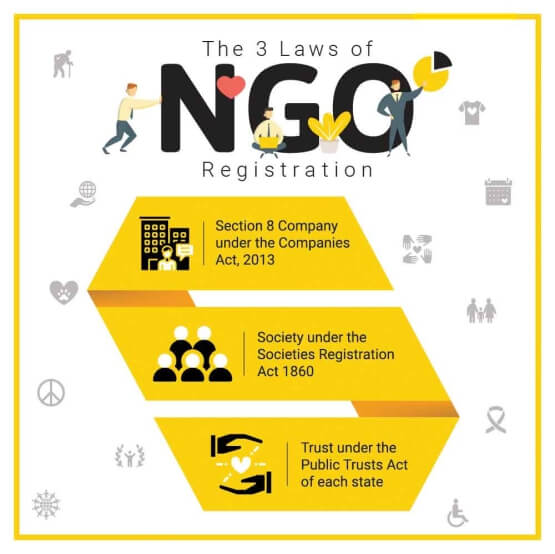View News
COMPREHENSIVE-GUIDE-TO-NGO-REGISTRATION-IN-INDIA-TRUST-SOCIETY-AND-SECTION-8-COMPANY

COMPREHENSIVE GUIDE TO NGO REGISTRATION IN INDIA: TRUST, SOCIETY, AND SECTION 8 COMPANY
INTRODUCTION:
Non-Governmental Organizations (NGOs) play a vital role in addressing social issues and promoting charitable activities in India. Choosing the right form of registration – Trust, Society, or Section 8 Company – is crucial for NGOs to operate effectively within the legal framework. In this comprehensive guide, we delve into the detailed procedures and benefits of NGO registration under each category, providing valuable insights into the legal and financial aspects.
TRUST REGISTRATION PROCEDURE:
1. Select an Appropriate Name:
- Choose a unique and meaningful name for the Trust.
2. Drafting of Trust Deed:
- Prepare a comprehensive Trust deed outlining the objectives and operational guidelines.
3. Selecting Settlers and Trustees:
- Identify individuals who will act as settlers and trustees of the Trust.
4. Preparing Memorandum of Association:
- Draft the Memorandum of Association (MoA) detailing the Trust's goals and functions.
5. Paying Requisite Fees:
- Pay the required fees for Trust registration.
6. Collection of a Copy of Trust Deed:
- Obtain a copy of the Trust deed after execution.
7. Submission of Trust Deed with the Registrar:
- Submit the Trust deed along with necessary documents to the Registrar.
8. Obtain Registration Certificate:
- Receive the registration certificate after approval.
BENEFITS OF TRUST REGISTRATION:
- Land acquisition from the government.
- Use of "Govt. Regd." or "Regd." in practice.
- Avail tax benefits and 80G certificate advantage.
- Eligibility for Goods & Service Tax (GST) benefits.
SOCIETY REGISTRATION PROCEDURE:
1. Choosing a Unique Name:
- Select a distinctive name adhering to Societies Act, 1860.
2. Preparing Memorandum of Society:
- Draft the Memorandum of Society and Rules and Regulations.
3. Prepare Documents:
- Gather necessary documents, including name, address, and identity proofs.
4. Filing of Application:
- File the signed Memorandum and Rules and Regulations with the Registrar of Societies.
5. Get Society Certification:
- Obtain certification from the Registrar upon successful registration.
BENEFITS OF SOCIETY REGISTRATION:
- Exemption from income tax.
- Separate legal identity, limited liability, and legal protection.
SECTION 8 COMPANY REGISTRATION PROCEDURE:
1. Apply for Digital Signature Certificate (DSC):
- Obtain DSC for electronic form signing.
2. Name Reservation through SPICE+:
- Use SPICE+ form for name reservation, including specific terms like Federation, Chambers, etc.
3. Submission of SPICE+ Part A Form:
- Submit Part A form for name reservation and incorporation.
4. Filing SPICE+ Part B:
- Download SPICE+ Part B for incorporation, including AoA, MoA, AGILE PRO, INC-9, and URC-1.
5. Preparing MoA and AoA:
- File MoA and AoA with auto-filled details from SPICE+.
6. Filing Details in AGILE PRO:
- Provide details in AGILE PRO, including GST, EPFO/ESIC, and bank account information.
7. Fill Requisite Details in INC-9:
- Complete INC-9 with the declaration by subscribers or First Director.
8. Filing Forms with MCA:
- Submit forms with the Ministry of Corporate Affairs.
9. Pre-Scrutiny Check and Payment:
- Conduct pre-scrutiny check and pay the requisite fee.
10. COI from the Registrar:
- Obtain the Certificate of Incorporation from the Registrar.
BENEFITS OF SECTION 8 COMPANY REGISTRATION:
- No minimum capital requirement.
- Separate legal entity, tax exemptions, and security of ownership or title transfer.
- No suffix requirement (Limited or Private Limited).
LAWS APPLICABLE TO NGOS IN INDIA:
- Trust under Indian Trusts Act, 1882.
- Society under Societies Registration Act, 1860.
- Section 8 of Companies Act, 2013.
PURPOSE OF NGO – SECTION 8 COMPANY:
- Promotion of non-profit objectives in commerce, art, science, sports, education, research, social welfare, religion, charity, protection of the environment, and related areas.
SECTION 8 COMPANY BENEFITS:
- No minimum capital requirement, tax benefits under 80G.
- No stamp duty, separate legal identity, limited liability.
- Credibility, exemption to donors under Section 12A and 80G.
SECTION 8 COMPANY REGISTRATION ELIGIBILITY:
- Individual, HUF, or two or more persons fulfilling requirements.
- At least one director must be a resident of India.
- Objectives related to sports, social welfare, science, art, education, or financial assistance to lower-income groups.
- No remuneration for founders, directors, and members.
SECTION 8 COMPANY INCORPORATION REQUIREMENTS:
- Minimum two directors for private, three for public.
- No minimum paid-up capital.
- Charitable objects in MOA and AOA.
- Compliance with the Companies Act, 2013, Income Tax Act, and GST Law.
PROCEDURE FOR SECTION 8 COMPANY INCORPORATION:
- Obtain DSC and DIN for directors.
- File INC-12 for license.
- File SPICE+ for incorporation.
- Obtain Certificate of Incorporation.
PENALTY FOR NON-COMPLIANCE:
- Revocation of license for non-compliance.
- Fines for defaulting companies, directors, and officers.
ANNUAL COMPLIANCES OF SECTION 8 COMPANY:
- Board meetings, books of accounts maintenance, financial statements preparation.
- Mandatory audit report, income tax return filing.
- Filing of financial statements (AOC 4) and annual return (MGT 7).
- Additional compliances for registration (12AA, 80G, etc.).
In conclusion, NGOs in India have the flexibility to choose the most suitable form of registration based on their objectives and operational requirements. Understanding the intricacies of Trust, Society, and Section 8 Company registrations is crucial for ensuring legal compliance and maximizing the benefits available to non-profit organizations.
Unlock the Potential of Legal Expertise with LegallMantra.net - Your Trusted Legal Consultancy Partner”
Article Compiled by:-
Mayank Garg
(LegalMantra.net Team)
+91 9582627751
Disclaimer: Every effort has been made to avoid errors or omissions in this material in spite of this, errors may creep in. Any mistake, error or discrepancy noted may be brought to our notice which shall be taken care of in the next edition In no event the author shall be liable for any direct indirect, special or incidental damage resulting from or arising out of or in connection with the use of this information Many sources have been considered including Newspapers, Journals, Bare Acts, Case Materials , Charted Secretary, Research Papers etc.

